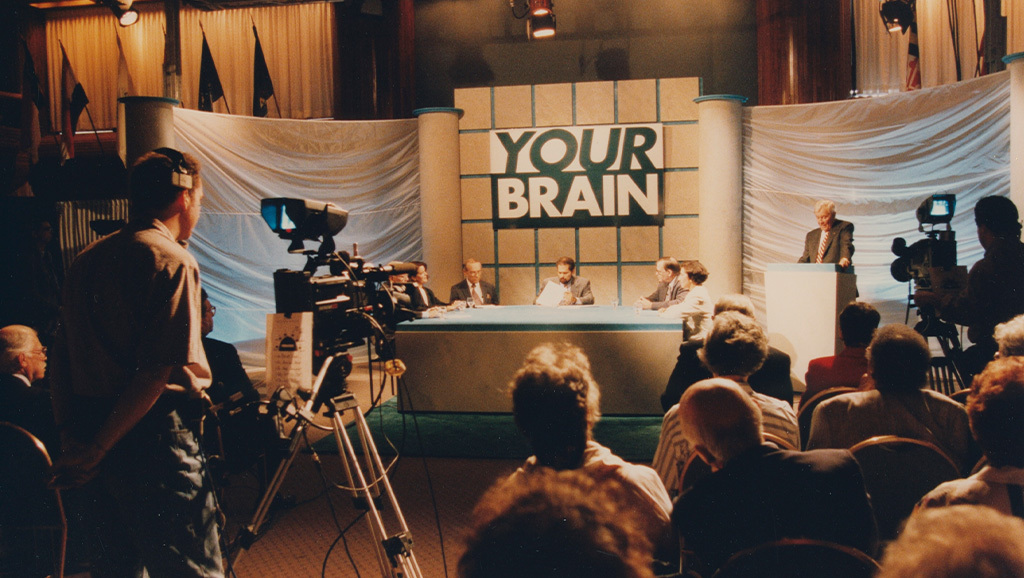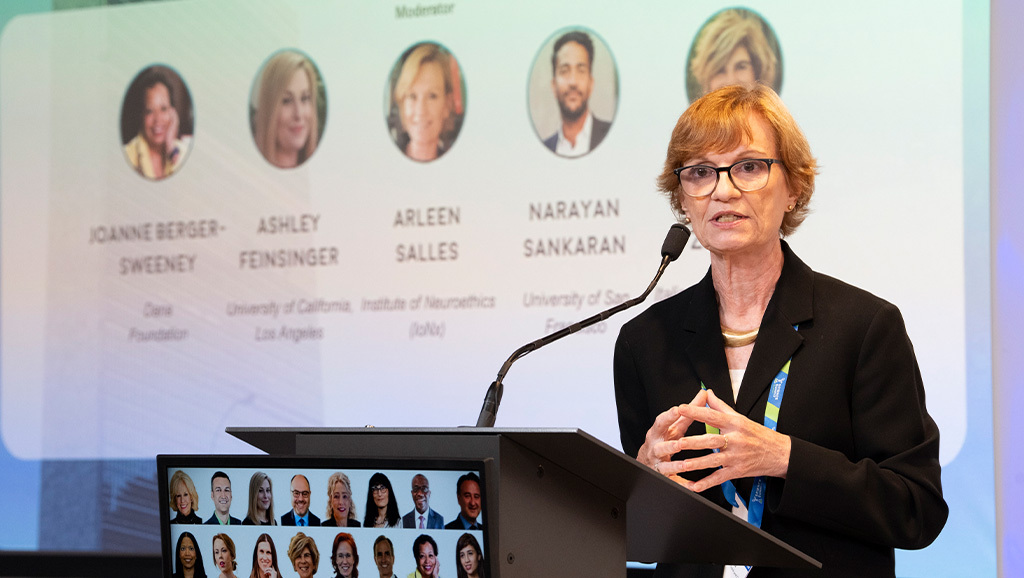News & Insights
Building a Collaborative Community to Advance Neurotechnology

From the earliest days when human brain signals were first harnessed to move a cursor across a computer screen to play Pong, brain-computer interfaces (BCIs) have presented the hope of restoring function in people living with neurologic disease or injury by enabling direct, or indirect, nervous system control of software and/or external devices.
Implantable BCIs (iBCIs) are devices that use software to interpret neural activity from surgically implanted sensors. Commonly, they are designed for improved access to communication or other technologies for people with physical disabilities. But despite the tremendous potential for iBCIs to unlock new frontiers in restorative neurotechnology and offer breakthroughs in neurorehabilitation, their realized potential has lagged behind their promise.
Even after 50 years of work, many critical, clinical, and regulatory questions about insurance coverage and payment for iBCIs remain unanswered, contributing to the slow access to these technologies. Research studies have also struggled to recruit their targeted number of participants, in some cases reflecting a disconnect between the needs of those living with neurological conditions and the focus of technology developers or scientific researchers.
Looking closer at the gap between expectations for iBCIs and their current state, a picture of a highly complex field emerges, full of moving parts and parties whose interests and actions all affect the others. For example, further investment in research and development is challenged by ambiguities in whether insurance will ever pay for these devices in clinical care—and insurance coverage decisions depend on research results, many of which are still pending. Overcoming the hurdles that slow research progress requires coordinated input from clinical end-users, ethicists, regulatory agencies, public research funders, and neurological device companies, many of whom rarely interact. Other challenges to iBCI marketability involve things such as the need for data standards and device interoperability, so that patients can expect an implanted device to be compatible with a variety of external devices and software, now and in the future.
An interdisciplinary team of three exceptional leaders recognized what was sorely needed: a forum to bring everyone together to work through these challenges collaboratively, so that actions can be harmonized to drive continuous innovation. Leigh Hochberg, M.D., Ph.D., an internationally respected leader in BCI development and clinical testing, and director of the Center for Neurotechnology and Neurorecovery at Massachusetts General Hospital; Jennifer French, executive director of the Neurotech Network and a Paralympic silver medalist; and Joe Lennerz, M.D., Ph.D., a regulatory science expert and director of the Pathology Innovation Collaborative Community approached the Dana Foundation with their idea to create an Implantable BCI Collaborative Community (iBCI-CC) to encourage the cross-sector relationships needed to overcome development hurdles.
The plan was for the iBCI-CC to convene a comprehensive set of involved groups, including people living with spinal cord injury or neurodegeneration, researchers, clinicians, medical device companies, patient advocacy groups, ethicists, regulators, payers, federal agencies, and research support organizations in the pre-competitive space. (“Pre-competitive space” refers to collaborative problem-solving opportunities involving companies in the same industry that might later compete in the market.) In this environment, the complex, systemic obstacles to developing iBCIs could begin to be addressed in a coordinated way.
Created by the Center for Devices and Radiological Health (CDRH) at the US Food and Drug Administration (FDA), the Collaborative Communities model was intended to encourage the formation of continuing forums where groups can proactively work together to achieve common objectives and outcomes, solve shared challenges, and leverage collective opportunities in an environment of trust, respect, empathy, and openness. Until now, there hasn’t been a Collaborative Community in the neuroscience space.
Dana Foundation staff saw the value of a Collaborative Community to support this type of open, transparent communication and collaboration. The iBCI-CC creates the potential for different communities to synergistically engage with one another’s perspectives to meaningfully drive action and policy. Bringing together such varied groups with overlapping interests but differing forms of expertise is not a trivial task. An essential component for success involves building trust and relationships between members of these different groups—creating an atmosphere in which diverse perspectives, including those with lived experience, could be brought together to tackle the complexity of iBCI-development. By providing a scaffold for these relationships, it becomes possible to select shared goals and outcome measures so that, as Leigh Hochberg observed, “BCIs are not only safe and effective, but also have thoroughly considered the design and function preferences of the people who hope to use them.”
Supporting the launch of the first neuroscience-related Collaborative Community aligns with the goal of the Dana Foundation’s Frontiers program by helping to launch an organization based on a powerful model for multidirectional engagement. Activities of the iBCI-CC directly support the creation of shared goals between scientific and public communities, and aim to embed public perspectives in research, policy, and decision-making. The project also tests a model which could be replicated to establish other neuroscience-related Collaborative Communities in the future.
The iBCI-CC, convened by Mass General Brigham, officially launched on March 11, 2024, with Dana Foundation support. The official press release for the iBCI-CC, with further background on its formation and activities, can be found here.



